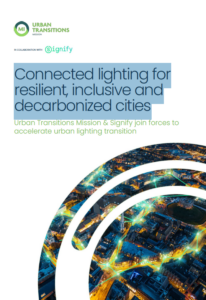Connected lighting for resilient, inclusive and decarbonized cities
Urban Transition Mission and Signify
New Guidelines and survey released to support cities’ transition efforts
The Urban Transitions Mission (UTM) and Signify jointly unveiled the new Guidelines “Connected Lighting for Resilient, Inclusive and Decarbonised Cities” at an online event held on 21 May 2025. This resource is the result of a year-long collaborative knowledge exchange focusing on urban lighting and delivers practical guidance for city officials and local government practitioners seeking to implement sustainable lighting solutions.
Urban areas can quickly and effectively cut energy usage, improve safety for residents, and support climate initiatives through strategic lighting improvements. The newly released Guidelines provide concrete suggestions that showcase how smart, connected lighting systems can be deployed to meet real-time urban needs whilst creating more resilient and inclusive city environments.
Alongside the Guidelines launch, a comprehensive urban lighting survey was introduced by the UTM, the Global Covenant of Mayors for Climate & Energy (GCoM), and Signify. This survey aims to evaluate the current status of lighting infrastructure across global cities, determine where gaps exist, and develop specific recommendations for enhancements. The collected data will help shape policy development and assist cities transitioning toward climate-resilient, low-carbon infrastructure.
Cities that complete the survey will qualify for a complimentary audit service from Signify, which includes a thorough assessment of their existing lighting systems and customized recommendations for improvements.
“The role of energy efficiency as the first fuel is a key pillar in the global energy transition towards net-zero GHG emissions in 2050”
G7 Minister’s Meeting on Climate, Energy and the Environment under Japan’s Presidency
About Urban Transitions Mission
The Urban Transitions Mission (UTM) mobilizes decision makers across all levels of government to prioritize climate neutral and net-zero pathways enabled by clean energy and systemic innovation across all sectors and in urban governance. By accelerating capacity-building and closing the gap between research, development and deployment, the Mission will empower cities to adopt innovative solutions and help reach tipping points in the cost and scale of those solutions for urban transitions.


